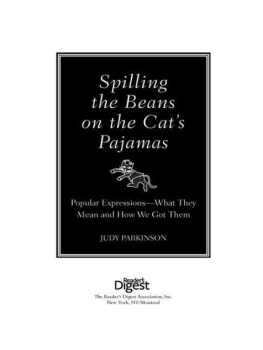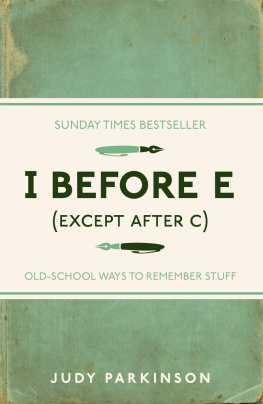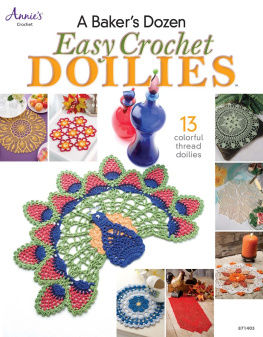Table of Contents
A READERS DIGEST BOOK
Copyright 2011 Michael OMara Books Limited
Illustrations 2009 Louise Morgan
All rights reserved. Unauthorized reproduction, in any manner, is prohibited.
Readers Digest is a registered trademark of The Readers Digest Association, Inc.
First published in Great Britain in 2009 by Michael OMara Books Limited
9 Lion Yard
Tremadoc Road
London SW4 7NQ
READERS DIGEST TRADE PUBLISHING
U.S. Project Editor: Siobhan Sullivan
Canadian Project Manager: Pamela Johnson
Canadian Project Editor: Jesse Corbeil
Project Production Coordinator: Nick Anderson
Senior Art Director: George McKeon
Executive Editor, Trade Publishing: Dolores York
Associate Publisher: Rosanne McManus
President and Publisher, Trade Publishing: Harold Clarke
Library of Congress Cataloging-in-Publication Data
Parkinson, Judy.
Spilling the beans on the cats pajamas : popular expressions? What they mean and how we got them / Judy Parkinson. p. cm.
A Readers Digest book.
eISBN : 978-1-606-52284-4
1. English language--Idioms--Dictionaries. 2. English language--Terms and phrases.
3. Figures of speech--Dictionaries. I. Title.
PE1689.P296 2010
423.13--dc22
2010016226
We are committed to both the quality of our products and the service we provide to our customers. We value your comments, so please feel free to contact us.
The Readers Digest Association, Inc.
Adult Trade Publishing
44 S. Broadway
White Plains, NY 10601
For more Readers Digest products and information, visit our website:
www.rd.com (in the United States)
www.readersdigest.ca (in Canada)
http://us.penguingroup.com
Old expressions are the best, and short ones even better.
-Winston Churchill
INTRODUCTION
The English language has flourished over the centuries. Our ever-flexible language often revives phrases that we thought had bitten the dustand new words and expressions creep into the lexicon all the time. Theres a different flavor of the month for each generation.
So strike while the irons hot: If you want to bone up on the origins of some of the curiosities of the English language, look through these pages and youll be in seventh heaven. This book is the cats whiskers and the cats pajamas, all rolled into one, as it spills the beans on the origins of all these expressions and many more.
I will make no bones about it, and I wont beat around the bush (after all, dont forget Im talking turkey here): This book contains some fascinating and remarkable stories about our best-loved and most colorful phrases. The staples of our languagethose familiar, well-worn expressions and clichsoriginate from the most diverse sources. From main street to Homer, from advertising to social networking websites, from the army to the air force, from stage to screenits an all-singing, all-dancing, around-the-world trip through our languages history.
If youve ever gone over the top, you can thank the military. Walk the plank and shake a leg are both nautical terms, and I wouldnt be rubbing salt in the wound to say that thats another one. The world of sport, meanwhile, provides rich pickings. To throw in the sponge and to come up to scratch are both boxing terms, and baseball has allowed us to take a rain check. But thats for another time. Look no further; youll be as pleased as Punch.
ADD INSULT TO INJURY
To hurt, by word or deed, someone who has already suffered an act of violence or injustice. The expression has been in use for centuries.
During the Augustan era, the so-called Golden Age of Latin literature, Phaedrus translated Aesops fables into Latin verse, peppering them with anecdotes of his own. He quotes the fable about a bald man who tried to swat a fly that had bitten him on the head, but who missed the insect and instead slapped himself hard on the head.
Seeing this the fly then remarked, You wished to kill me for a mere touch. What will you do to yourself since you have added insult to injury?
ALIVE AND KICKING
Active and in good health. The expression was coined in the late eighteenth century and probably referred originally to a healthy baby, either while still in the womb or just after birth.
ALL CATS LOVE FISH, BUT FEAR TO WET THEIR PAWS
A traditional saying, dating back to at least the sixteenth century, used to describe a person who is eager to obtain something of value, but who is not bold enough to make the necessary effort or to take the risk.
It is to this saying that William Shakespeare referred in Macbeth (1:7):
Letting I dare not wait upon I would, Like the poor cat i the adage.
ALL IN A DAYS WORK
Said of an unusual or unexpected task that can be obligingly included in the normal daily routine.
The expression was common by the eighteenth century and may stem from the nautical use of the term days work, which referred to the reckoning of a ships course during the twenty-four-hour period from noon one day to noon the next.
A character in Sir Walter Scotts novel The Monastery says, That will cost me a farther ridebut it is all in the days work.
ALL OVER BUT THE SHOUTING
This expression is firmly rooted in the world of sports and was first used in print by nineteenth-century sportswriter Charles James Apperley in 1842. It means that victory is in the bag, only the cheering of the crowd at the end of the game or contest remains to come.
The phrase may perhaps be derived specifically from boxingthe shouting being the noisy appeal from the supporters of one of the boxers against the referees decision.
It is also often applied to political elections in which the outcome is certain, even before the ballot papers have been counted.
ALL SINGING, ALL DANCING
This piece of popular phraseology was inspired by the first Hollywood musical, Broadway Melody , in 1929the era in which sound first came to the movies, which was advertised with posters proclaiming:
The New Wonder of the Screen!
ALL TALKING
ALL SINGING
ALL DANCING
Dramatic Sensation!
The phrase caught on immediately, and two rival studios used the same sales pitch in the same year for Broadway Babes and Rio Rita .
In about 1970, the computing world adopted the phrase to hype up new software, so that by the mid 1980s, every kind of organization seemed to boast that their computers and systems packages had some quality that was all singing, all dancing.
Subsequently, the expression has been linked with anything from savings plans, pensions and mortgages to machinesespecially electronically controlled machinesof almost any kind.
A saying with a similar meaning is the older phrase All the bells and whistles, which also describes that all-important wow factor.
ALL TARRED WITH THE SAME BRUSH
Everyone in the group shares the same failings; theyre all sheep of the same flock. This old saying alludes to the methods used by farmers to mark their sheep. A brush dipped in tar was applied to the wool as a form of branding.













